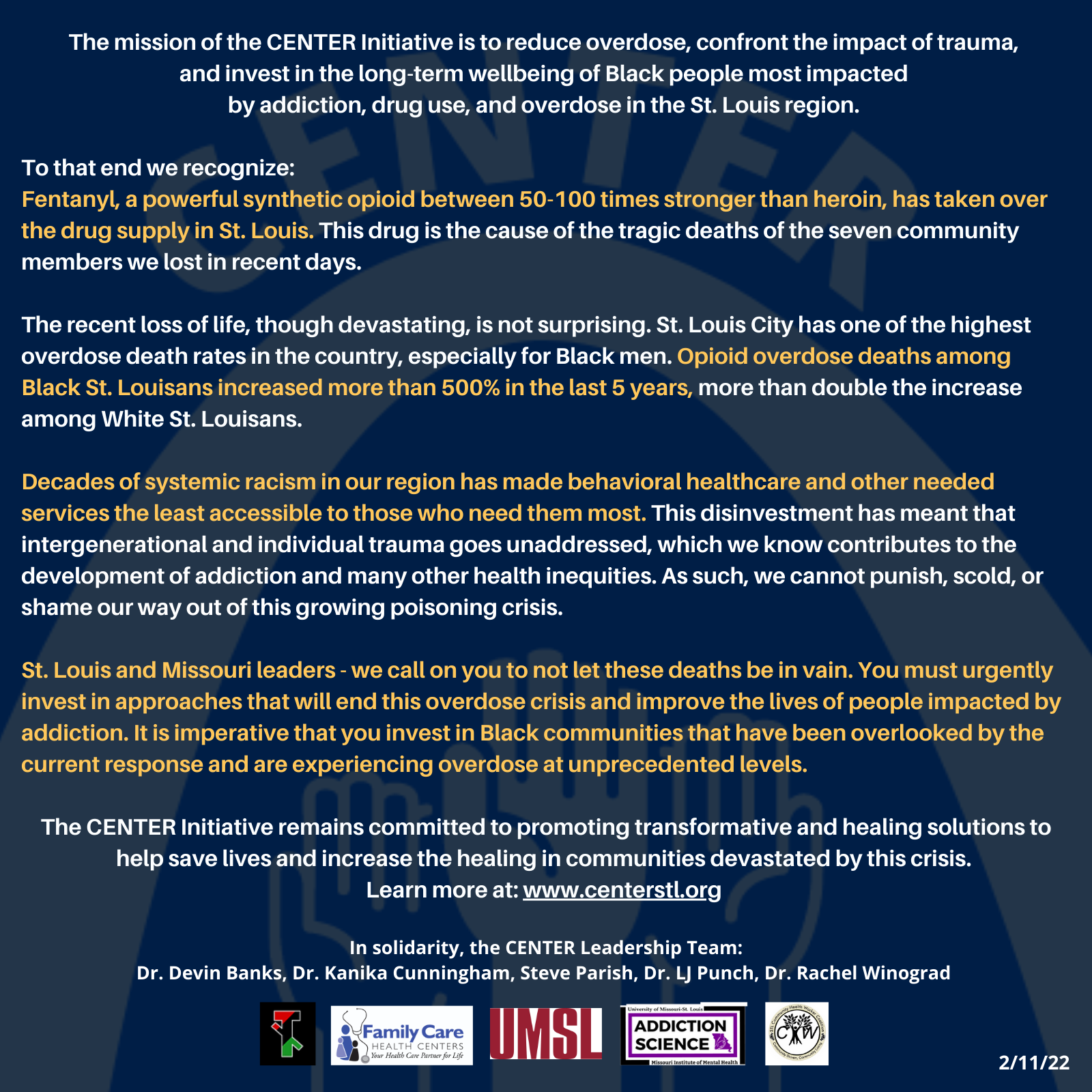“A model of this successful engagement to improve access to naloxone and other opioid overdose reversal medications in public housing occurred in St. Louis, MO. Partners from across the community, including a non-profit organization, a federally qualified health center, and the local health department collaborated with the (local) St. Louis Public Housing Authority to successfully distribute naloxone to residents and provide overdose recognition and response training to housing residents and property managers.”
Parkview Resident Testimony
In this video, a community health worker interviews a resident about their perspective on the impact of naloxone distribution in public housing.
CENTER Initiative Remembers Parkview One Year Later: Further Action Needed
February 3rd, 2023
One year later, we take time to acknowledge the painful, mass overdose event that occurred this time last year (2022) at Parkview Apartments taking 9 of our neighbors' lives. As we honor them, we must also recognize the 652 additional members of our community who needlessly passed away in St. Louis City and County last year due to the fentanyl-poisoned drug supply and lack of access to life-saving naloxone, effective treatment, and supportive recovery services. Over half of those lost to overdose in the St. Louis region in 2022 were Black or African American.
Black people in St. Louis are disproportionately suffering the dangerous effects of our fentanyl poisoned drug supply including imprisonment, illness, and death. Rates of drug-involved death have increased almost 400% among Black men since 2015 when fentanyl, a synthetic opioid 100 times stronger than morphine, began appearing in our region.
In a community where there are few 24/7 shelter options, it is illegal to access clean syringes and tools that rapidly check drugs for fentanyl, and more than 100,000 people are in Missouri’s criminal justice system a year, our policies and priorities are making it harder for people to get the life-saving assistance they need. The recent CENTER study conducted in St. Louis found that addressing basic needs is critical to combating overdose in Black communities. Right now, people who use drugs are struggling to survive; this disproportionately affects Black people and communities due to historical racism, neighborhood disinvestment, and higher rates of criminalization. Without security and stability, it is difficult to get through the day, let alone get to a treatment provider or doctor’s office.
Decades of research and personal stories from our neighbors show we cannot punish, scold, or shame our way out of the growing overdose crisis. Instead, people achieve wellness through compassion and ongoing support. With this in mind, we recommend these immediate investments to increase the options available to people who most need healing and hope:
Respite and recovery housing to give people a place to stabilize, meet their basic needs, and decide their next steps in safety even if they recently used drugs.
Same-day access to addiction treatment through community comfort and drop-in centers and substance use clinics, including expanding access to medications for addiction treatment (MAT) as part of everyday patient care with the recent repeal of the X-Waiver.
A workforce of care navigators, community health workers, and peer specialists from our neighborhoods to advocate for patients and help people get the healthcare and support they need.
Universal access to naloxone in publicly-funded housing environments like Parkview, as well as all city and county service sites, libraries, and shelters.
Support, decriminalization, and expansion of harm reduction tools, sterile syringes & drug checking equipment, which help prevent deadly health consequences such as skin infections, HIV, hepatitis, and overdose.
The CENTER team welcomes input and response from local and state leaders working to reduce the harms associated with our unpredictable drug supply and the broader War on Drugs. Contact us at CENTER@mimh.edu to share your vision for honoring the lives we’ve lost and preventing more devastating deaths of our St. Louis family, friends, and neighbors. You can also get involved by:
CENTER Initiative Urges
Increased Investment in Wake of
Recent Overdose Deaths
February 11th, 2022
The mission of the CENTER Initiative is to reduce overdose, confront the impact of trauma, and invest in the long-term wellbeing
of Black people most impacted by addiction, drug use, and overdose in the St. Louis region.
To that end we recognize:
Fentanyl, a powerful synthetic opioid between 50-100 times stronger than heroin, has taken over the drug supply in St. Louis. The seven community members we lost in recent days died from ingesting cocaine laced with fentanyl.
The recent loss of life, though devastating, is not surprising. St. Louis City has one of the highest overdose death rates in the country, especially for Black men. Opioid overdose deaths among Black St. Louisans increased more than 500% in the last 5 years, more than double the increase among White St. Louisans.
Decades of systemic racism in our region has led to disinvestment and trauma within St. Louis’ Black communities. This disinvestment means that behavioral health and other necessary services are least accessible to those who need them most. Individual and communal trauma often remains unaddressed, which contributes to the development of addiction and many other health inequities. As such, we cannot punish, scold, or shame our way out of this growing poisoning crisis.
St. Louis and Missouri leaders - we call on you to not let these deaths be in vain. You must urgently invest in approaches that will end this overdose crisis and improve the health and well-being of people who use drugs. It is imperative you invest in Black communities that are experiencing overdose at unprecedented levels.
The CENTER Initiative remains committed to promoting transformative and healing solutions to help save lives and
increase the wellness of communities devastated by this crisis. Learn more at: www.centerstl.org
In solidarity, the CENTER Leadership Team,
Dr. Devin Banks, Dr. Kanika Cunningham, Steve Parish, Dr. LJ Punch, Dr. Rachel Winograd




